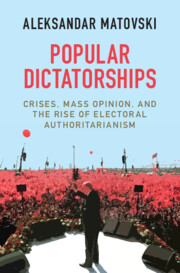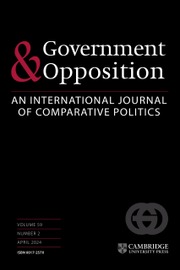The Two Logics of Autocratic Rule
- Author: Johannes Gerschewski, Wissenschaftszentrum Berlin für Sozialforschung
- Date Published: August 2024
- availability: Available
- format: Paperback
- isbn: 9781009199384
Paperback
Other available formats:
Hardback, eBook
Looking for an inspection copy?
This title is not currently available on inspection
-
In The Two Logics of Autocratic Rule, Gerschewski argues that all autocracies must fulfil three conditions to survive: the co-optation of key elites into their inner sanctum, the repression of potential dissent, and popular legitimation. Yet, how these conditions complement each other depends on alternative logics: over-politicization and de-politicization. While the former aims at mobilizing people via inflating a friend-foe distinction, the latter renders the people passive and apathetic, relying instead on performance-driven forms of legitimation. Gerschewski supports this two-logics theory with the empirical analysis of forty-five autocratic regime episodes in East Asia since the end of World War II. In simultaneously synthesizing and extending existing research on non-democracies, this book proposes an innovative way to understand autocratic rule that goes beyond the classic distinction between totalitarian and authoritarian regimes. It will be of interest to scholars and students of comparative politics, political theory, and East Asian politics.
Read more- Familiarizes the reader with an inventory of the distinct theoretical strands and empirical results on the topic of autocratic rule accumulated to date
- Provides an accessible theory to readers that explain why some autocracies remained stable while others broke down
- Offers an overview of the diverse autocratic experience of all East Asian countries since the end of the World War II
Reviews & endorsements
'This is a landmark in the study of authoritarian stability. Gerschewski moves beyond the recent trend in understanding authoritarian regime durability as a product of material and coercive factors to reintegrate ideological and normative factors that legitimize dictatorship into our understanding. He provides a fuller picture of why authoritarianism proved to be more durable than many had anticipated.' Michael Bernhard, University of Florida
See more reviews'With sweeping breadth, yet solidly anchored in both classical and contemporary debates, Johannes Gerschewski introduces a bold macro-theoretical framework for the comprehension of authoritarian stability. While the current literature revolves around the authoritarian control of regime elites, he brings the authoritarian control of the people (by mass mobilization or mass privatization) back in. His configurational analysis of 'patterns of autocracy' is a must-read for everyone who strives to understand the enduring resilience of autocratic rule.' Andreas Schedler, Central European University
'Based on a remarkable synthesis of the extensive literature on autocracies, this book offers a compelling argument about the two logics of authoritarian rule that is tested through the empirical analysis of autocratic stability in East Asia. An impressive achievement.' Martin K. Dimitrov, Tulane University
'In this brilliant and intellectually ambitious book, Johannes Gerschewski re-evaluates the field of authoritarian studies in a highly innovative manner, focusing on their quest for certainty and stability. He links some of the established theoretical approaches with a remarkable set of detailed empirical comparative analyses of East Asian dictatorships. Teasing out contrasting argumentative logics that apply generally to the nature of authoritarianism, and plugging many gaps in the existing literature, Gerschewski offers a sophistication and depth for which a new generation of scholars will be gratefully indebted.' Michael Freeden, University of Oxford
'Can any single theoretical framework make sense of the diverse authoritarian regimes we witness across Asia and the world today, from North Korea's ruling family to Singapore's ruling party to Myanmar's ruling military? Johannes Gerschewski succeeds in just such an effort, convincingly showing that diverse autocracies face the same fundamental challenges and can counter them in one of two ways: either by making everything political, or by making everything apolitical. The Two Logics of Autocratic Rule is a genuine triumph.' Dan Slater, University of Michigan
Customer reviews
Not yet reviewed
Be the first to review
Review was not posted due to profanity
×Product details
- Date Published: August 2024
- format: Paperback
- isbn: 9781009199384
- length: 313 pages
- dimensions: 229 x 152 x 17 mm
- weight: 0.456kg
- availability: Available
Table of Contents
Part I. Introduction: Part II. Theory:
1. Explaining autocratic stability
2. Legitimation
3. Repression
4. Co-optation
5. The two logics of autocratic rule
Part III. Empirical Test:
6. East Asia as a testing field
7. Empirical explorations
8. A systematic test
Part IV. Conclusion.-
General Resources
Find resources associated with this title
Type Name Unlocked * Format Size Showing of
This title is supported by one or more locked resources. Access to locked resources is granted exclusively by Cambridge University Press to lecturers whose faculty status has been verified. To gain access to locked resources, lecturers should sign in to or register for a Cambridge user account.
Please use locked resources responsibly and exercise your professional discretion when choosing how you share these materials with your students. Other lecturers may wish to use locked resources for assessment purposes and their usefulness is undermined when the source files (for example, solution manuals or test banks) are shared online or via social networks.
Supplementary resources are subject to copyright. Lecturers are permitted to view, print or download these resources for use in their teaching, but may not change them or use them for commercial gain.
If you are having problems accessing these resources please contact [email protected].
Sorry, this resource is locked
Please register or sign in to request access. If you are having problems accessing these resources please email [email protected]
Register Sign in» Proceed
You are now leaving the Cambridge University Press website. Your eBook purchase and download will be completed by our partner www.ebooks.com. Please see the permission section of the www.ebooks.com catalogue page for details of the print & copy limits on our eBooks.
Continue ×Are you sure you want to delete your account?
This cannot be undone.
Thank you for your feedback which will help us improve our service.
If you requested a response, we will make sure to get back to you shortly.
×




